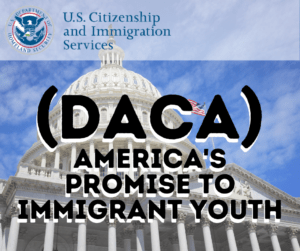DACA and Congress
 Legislators have spent the last few weeks scrambling for solutions in the wake of a Texas judge’s July 16th decision ruling the Deferred Action for Childhood Arrivals Program (DACA) unconstitutional. While the decision has no effect on current DACA recipients (Dreamers), it has halted new applications. President Biden called the decision “deeply disappointing” and announced the U.S. Department of Justice’s plan to appeal the ruling. However, Biden also acknowledged in his statement that only Congress can ensure a permanent solution, and called upon the body to pass the American Dream and Promise Act in order to provide a stable path to citizenship for DACA recipients.
Legislators have spent the last few weeks scrambling for solutions in the wake of a Texas judge’s July 16th decision ruling the Deferred Action for Childhood Arrivals Program (DACA) unconstitutional. While the decision has no effect on current DACA recipients (Dreamers), it has halted new applications. President Biden called the decision “deeply disappointing” and announced the U.S. Department of Justice’s plan to appeal the ruling. However, Biden also acknowledged in his statement that only Congress can ensure a permanent solution, and called upon the body to pass the American Dream and Promise Act in order to provide a stable path to citizenship for DACA recipients.Congress has tried to meet rising pressures by introducing new policy initiatives in the upcoming budget reconciliation bill. This avenue would allow Senate Democrats to bypass the GOP with only a simple majority, as long as support among the Democrats is unanimous. The plan is not yet complete, but will likely include $120 billion to create a pathway to citizenship for Dreamers and permanent green card status for undocumented farmworkers and recipients of Temporary Protected Status. If successful, it would be a major win in immigration reform.
Unfortunately, legal restrictions make this venture unlikely. The Byrd Rule limits budget reconciliation bills to the realm of spending and taxes. If the Senate Parliamentarian rules that these immigration measures fall outside this scope, they will not be included. The possibility of this is still being debated. While the current Senate Parliamentarian was a former immigration lawyer, she has blocked many Democrat proposals before. It seems the only stable course of action now is the most undesirable to Congress — negotiation with the GOP.


Comments are closed.